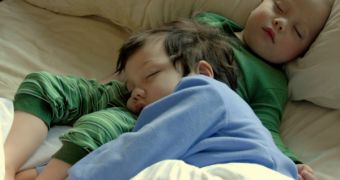A new research, published in the journal Pediatrics on Monday, showed that genetics played a very important role in the onset of night terrors in children aged under 18 months. The results were obtained after researchers at Montreal's Sacre-Coeur Hospital Sleep Disorders Center, in Canada, studied 390 twin pairs, both identical and fraternal.
However, Dr. Bich Hong Nguyen's team failed to identify the exact genes that trigger these manifestations, which often end up with children waking up in screams. This kind of terrors were proven to be more likely to appear in identical twins, seeing how their genetic make-up is very similar, and that they grow under the same circumstances throughout their childhood.
This closeness that identical twins display led scientists to believe that environmental factors could be at work to trigger these episodes. But further studies of fraternal, or dizygotic, twins revealed that they also experienced similar behavior, though they were living separately and shared very little experiences in common. Having noticed that, the researchers hypothesized that genetic factors can also play an essential role in such conditions as sleepwalking and sleep talking.
"The onset of sleep terrors is abrupt and frightening, usually sudden arousal with screaming. During these events children seem confused and disoriented. Any attempt to awaken them may increase their agitation and prolong their episode," reads the recently-published paper, where the researchers try to distinguish between night terrors and nightmares. They also say that, in the kids they observed, most pairs seemed to move past night terrors when they were 30-months old.
Nightmares are usually remembered the next morning, and people tell their stories all the time. But terrors are mostly a thing of the subconscious, the researchers say, and could represent an outbreak of our ancestral brain, similar to that which causes most children, and even grown-ups, to fear the dark.

 14 DAY TRIAL //
14 DAY TRIAL //